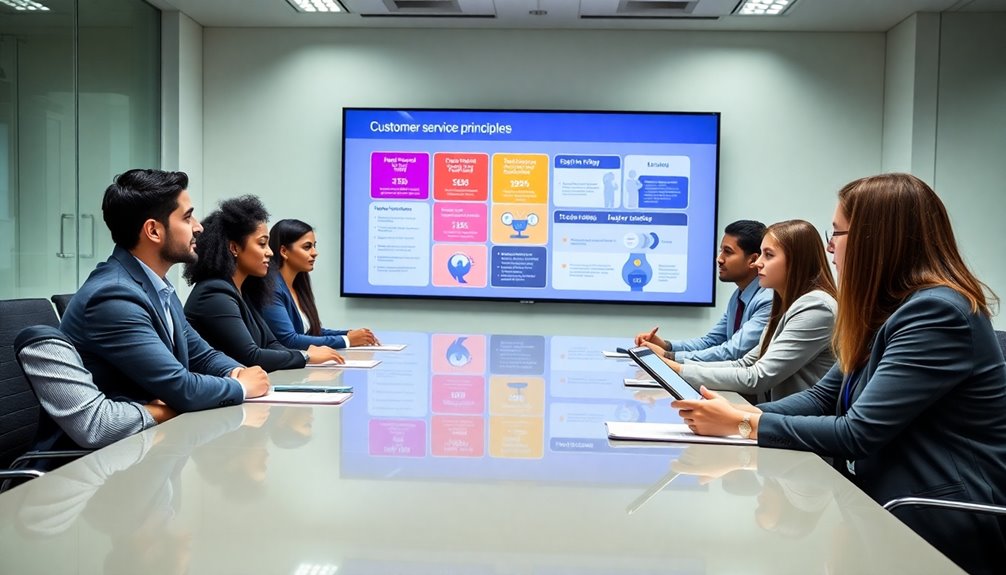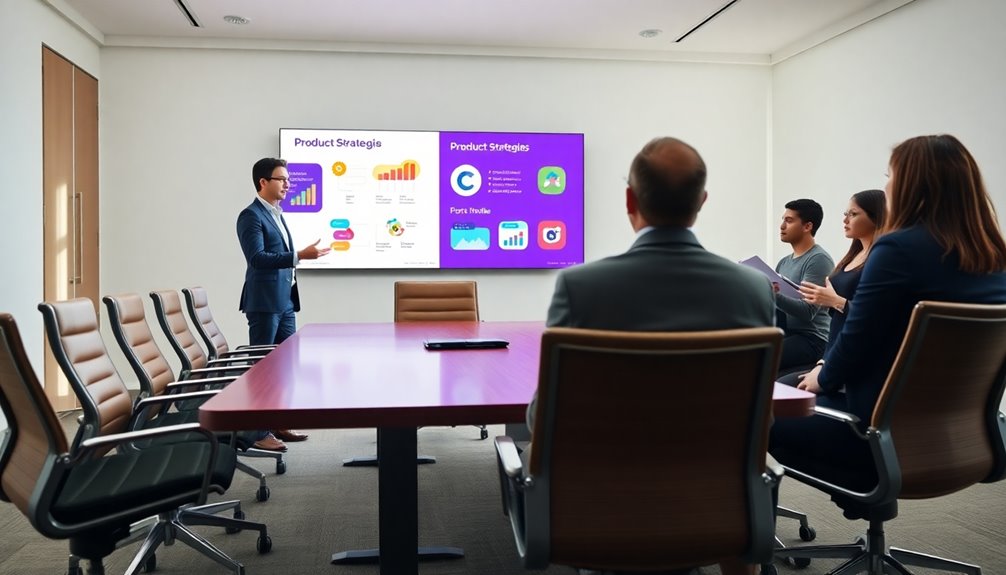To win over recruiters, you've gotta nail essential customer service questions that highlight your skills. Start by showcasing your understanding of customer service fundamentals, like the importance of empathy and active listening. Use the STAR method to demonstrate problem-solving abilities in tough situations. Employers value emotional intelligence, so be prepared to discuss how you build rapport with clients. Follow-up effectively after your interview to leave a lasting impression—personalized thank-you notes can set you apart. Embrace these strategies, and you'll be better positioned for success in your job search. There's more to discover that can boost your chances even further!
Key Takeaways
- Demonstrate strong communication skills by using active listening and non-verbal cues to engage with recruiters effectively.
- Showcase empathy in your responses, highlighting your ability to connect with customers and resolve conflicts.
- Use the STAR method to structure your answers, clearly outlining situations, tasks, actions, and results in your experiences.
- Emphasize your emotional intelligence, demonstrating how it contributes to improved customer satisfaction and team dynamics.
- Follow up after interviews with personalized thank-you emails, reinforcing your interest and professionalism in the application process.
Understanding Customer Service Fundamentals

Understanding customer service fundamentals is essential for anyone looking to thrive in today's competitive market. When you grasp the importance of effective customer service, you set yourself apart from the competition. Did you know that 70% of customers are willing to spend more when they receive excellent service? This directly impacts your company's revenue and growth.
Strong communication skills are a must. Research shows that 55% of customer interactions hinge on non-verbal cues like body language and tone. You need to be aware of these elements to create a positive experience. Additionally, 90% of customers expect consistent interactions across all channels, so your approach must be cohesive.
Empathy also plays a significant role in customer service. About 80% of consumers prefer to stay loyal to companies that demonstrate empathy during interactions. This means you should genuinely understand and address customer needs and expectations.
Lastly, remember that continuous training in customer service skills can lead to a 24% increase in employee engagement. Engaged employees are more likely to deliver excellent service, which boosts customer satisfaction and loyalty. By mastering these fundamentals, you're positioning yourself for success in the industry.
Key Customer Service Questions

When you're preparing for a customer service interview, think about how you handle difficult situations and communicate effectively. Building rapport quickly can set the tone for a positive customer experience, so be ready to share your strategies. Highlighting these skills can demonstrate your ability to meet customer needs and resolve issues efficiently. Additionally, understanding customer needs can help you tailor your approach to ensure satisfaction.
Handling Difficult Situations
Facing difficult situations is an inevitable part of customer service, and how you handle them can set you apart from other candidates. When you encounter conflicts or dissatisfaction, it's essential to demonstrate your ability to solve problems effectively. Reflect on past experiences where you navigated challenges, such as misunderstandings or mismatches. Show how you proactively managed these situations and set clear expectations with clients or candidates.
Utilizing the STAR method can help you articulate your approach. Clearly outline the Situation you faced, the Task at hand, the Action you took, and the Result that followed. This structured response not only highlights your problem-solving skills but also showcases your adaptability.
Don't forget to emphasize resilience and resourcefulness. Recruiters look for candidates who can handle setbacks, like candidate dropouts or demanding clients, without losing composure. Furthermore, providing constructive and empathetic feedback can strengthen relationships, which is essential in customer service roles. By demonstrating these qualities, you'll impress recruiters and prove that you're well-equipped to handle difficult situations effectively. In addition, drawing on mindfulness practices can enhance your self-awareness during challenging interactions, enabling you to respond more thoughtfully.
Effective Communication Skills
Effective communication skills are essential to excelling in customer service, influencing 70% of customers' overall satisfaction with a service provider. To truly connect with customers, it's crucial to practice active listening. This approach allows you to fully understand their needs, resulting in a 25% increase in problem resolution rates.
Also, don't underestimate the power of non-verbal communication skills. Research shows that 93% of communication effectiveness comes from non-verbal cues like maintaining eye contact and displaying positive body language. These elements can greatly enhance your interactions, making customers feel valued.
Clarity is key too. Most customers—about 75%—prefer straightforward answers over technical jargon. By communicating clearly and concisely, you minimize misunderstandings and foster trust.
Finally, always be open to feedback. Regularly asking customers about your communication style can lead to improvements. Organizations that prioritize this feedback often see a 30% increase in customer retention. Additionally, fostering a safe space for expressing feelings can create a more comfortable environment for customers to share their concerns.
Building Rapport Quickly
Building rapport quickly is essential in customer service, as it sets the tone for a positive interaction. When meeting with recruiters, remember that first impressions are formed within just 7 seconds. To make those moments count, engage in active listening and ask clarifying questions. This shows your curiosity and genuine interest, helping you forge a personal connection.
As you prepare for interview questions, communicate your understanding of the company culture and values. This alignment helps you resonate with recruiters and demonstrates how your aspirations fit within their organizational goals. Use frameworks like SAR (Situation, Action, Result) or STAR (Situation, Task, Action, Result) to articulate your relevant experiences clearly. Compelling narratives can captivate recruiters, establishing rapport through shared understanding.
Finally, don't underestimate the power of follow-ups. Engaging in informal check-ins, like coffee chats or Zoom calls, keeps the relationship strong and shows your enthusiasm and commitment to the opportunity. By focusing on building rapport quickly, you enhance your chances of leaving a lasting positive impression on recruiters, making you a standout candidate in the competitive customer service landscape. Additionally, utilizing predictive modeling to understand potential interviewer preferences can further tailor your approach.
Demonstrating Empathy and Adaptability

When you're in a customer service role, active listening is key to understanding your customers' needs. Being adaptable in your problem-solving approach shows that you're ready to tackle challenges as they arise. Plus, having emotional intelligence not only helps you connect with customers but also enhances their overall experience. Additionally, establishing healthy boundaries can prevent misunderstandings and foster more effective communication with customers.
Active Listening Skills
Active listening skills are essential in interviews, as they help you demonstrate both empathy and adaptability. When you engage in active listening, you guarantee that you fully understand the recruiter's needs and concerns. This fosters a stronger connection, making it easier to respond effectively. Research shows that effective active listening can improve communication outcomes by 40%, enhancing your ability to answer questions thoughtfully.
To exhibit adaptability, practice summarizing and reflecting back what the recruiter says. This shows that you're not only listening but also comprehending and engaged in the conversation. Recognizing non-verbal cues and emotional tones is a critical part of empathetic listening, allowing you to tailor your responses and build rapport with the recruiter.
Moreover, practicing active listening can greatly reduce interview anxiety. When you focus on engaging in meaningful dialogue, you reflect a willingness to collaborate and align with the recruiter's objectives. This proactive approach not only highlights your communication skills but also demonstrates your commitment to understanding the role and how you can contribute. Remember, active listening is a powerful tool that can set you apart from other candidates.
Flexible Problem-Solving Approaches
Effective problem-solving in customer service hinges on your ability to demonstrate empathy and adaptability. When you actively listen to candidate concerns and address them promptly, you enhance the overall candidate experience and build trust. Employing flexible problem-solving approaches allows you to adapt your strategies based on real-time feedback, showcasing your critical thinking under pressure. Incorporating techniques such as mindfulness meditation can also help improve your focus and emotional health, further aiding in effective communication.
| Approach | Benefits |
|---|---|
| Active Listening | Builds trust and understanding |
| Real-time Feedback | Leads to effective, tailored solutions |
| Collaborative Method | Fosters partnership and support |
| Empathetic Interactions | Increases candidate recommendations |
| Adaptability | Showcases resilience and proactivity |
Emotional Intelligence Awareness
Emotional intelligence (EI) plays a pivotal role in the recruitment process, allowing candidates to connect with interviewers on a deeper level. When you demonstrate empathy, you foster stronger connections that leave a positive impression. Studies reveal that 90% of top performers possess high emotional intelligence, underscoring its importance in maneuvering interpersonal dynamics during interviews.
By showcasing your adaptability, especially in high-pressure situations, you can considerably enhance your perceived value. Employers often prioritize candidates who thrive in changing environments, making this trait essential for success. Demonstrating empathy can also alleviate tension; when you express understanding of the interviewer's challenges, you position yourself more favorably in their eyes.
Effective communication, a key component of emotional intelligence, improves collaboration and teamwork—qualities that employers across various industries highly value. So, during your interview, focus on listening actively and responding thoughtfully to build rapport. By highlighting your emotional intelligence awareness, you not only set yourself apart from other candidates but also showcase your potential to contribute positively to the workplace culture. Remember, it's not just about answering questions; it's about creating connections that resonate long after the interview ends. Furthermore, effective short speeches can enhance your ability to articulate your thoughts clearly and concisely during interviews.
Handling Difficult Scenarios

In the fast-paced world of recruitment, maneuvering difficult scenarios is an essential skill that can greatly influence client relationships and candidate experiences. When faced with a candidate dropout, it's imperative to implement a backup plan and actively seek alternatives. This proactive approach helps maintain client trust and prevents disruptions in the hiring process.
Delivering difficult feedback, like a candidate rejection, requires preparation. Be clear and empathetic to guarantee all parties have manageable expectations. This clarity can lead to positive responses, even in challenging situations. If you encounter candidates with unrealistic expectations, engage them in honest conversations to recalibrate their aspirations. This dialogue enhances communication throughout the recruitment process.
When a candidate placement fails, clear mediation between the candidate and client is essential. Address concerns constructively to uphold professionalism and guide improvements for future screenings. In high-pressure environments, prioritize tasks and use stress management techniques to meet tight deadlines, ultimately exceeding client expectations. By honing these skills, you'll navigate difficult scenarios more effectively, strengthening relationships and enhancing your reputation in the recruitment field. Additionally, maintaining a cooperative co-parenting plan can serve as a helpful strategy to manage relationships during personal challenges that may impact professional commitments.
Importance of Active Listening

Active listening transforms the recruitment process, creating a dynamic environment where candidates feel heard and valued. When you engage in active listening, you enhance communication, allowing you to fully grasp questions and respond thoughtfully. This not only boosts your interview performance but also builds rapport with recruiters, leading to a more engaging conversation that can elevate your confidence.
By practicing active listening, you can pick up on cues from recruiters about the role and company culture. This insight helps you tailor your responses effectively, showing how you fit within the organization. Furthermore, effective communication—anchored in active listening—can greatly increase your chances of success in interviews. Recruiters perceive candidates who exhibit these skills as more competent and trustworthy.
Additionally, active listening equips you with the ability to ask insightful follow-up questions. This illustrates your interest and clarifies expectations, further solidifying your candidacy. Remember, every interaction is an opportunity to showcase your skills, and active listening is a powerful tool in your arsenal. Embrace it to create a lasting impression and win over recruiters.
Showcasing Problem-Solving Skills

Effective communication skills, including active listening, lay a solid foundation for showcasing your problem-solving abilities in interviews. Employers prioritize candidates who can demonstrate effective solutions to challenges, making your problem-solving skills essential. To effectively articulate your experiences, utilize the STAR (Situation, Task, Action, Result) framework. This method allows you to present your problem-solving experiences clearly and quantitatively, enhancing your credibility.
Prepare specific examples of past challenges you've faced, emphasizing metrics that showcase the impact of your solutions. Data-driven narratives resonate with hiring managers and can greatly boost your chances of success. Research indicates that candidates who communicate their problem-solving processes effectively are 50% more likely to receive positive feedback from interviewers.
Additionally, demonstrating adaptability and innovative thinking in response to challenges can really set you apart. With 72% of employers valuing flexibility in problem-solving approaches, showcasing your ability to pivot and find creative solutions will make a strong impression. Remember, it's not just about the problems you've solved; it's about how you approached them and the results you achieved. By preparing and sharing your experiences thoughtfully, you'll effectively showcase your problem-solving skills to potential employers. Furthermore, the concept of continuous learning is also crucial, as it helps you stay updated on best practices in problem-solving and enhances your adaptability.
Engaging With Constructive Feedback

Constructive feedback plays an essential role in your growth as a candidate. Engaging candidates through regular check-ins—whether over lunch or via Zoom—keeps you informed about your progress in the recruitment process. These interactions aren't just about updates; they're opportunities for you to receive valuable insights that can enhance your performance.
Mock interviews provide a practical way to receive constructive feedback while identifying areas for improvement. You'll gain confidence knowing you're well-prepared for final interviews. Additionally, constructive feedback during preparation reinforces your readiness, making you feel valued and better equipped to succeed.
Engaging candidates with tasks and short questionnaires also encourages continuous development. These activities allow you to showcase your growth and adaptability, demonstrating your commitment to improvement. Consistent communication and constructive criticism not only strengthen your relationship with recruiters but also foster loyalty. For instance, understanding the importance of establishing a bedtime routine can enhance your time management skills, which is crucial during the job search process.
Building Rapport With Clients

Building rapport with clients is essential for fostering strong, lasting relationships that drive loyalty and growth. When you prioritize personal connections, you align yourself with 83% of clients who value these partnerships. Start by actively engaging in effective communication. Regular check-ins, whether through coffee chats or virtual meetings, keep clients informed and foster a sense of trust.
Understanding client needs through discovery questions is key. This helps you tailor recruitment strategies, enhancing alignment with their expectations and improving satisfaction with the hiring process. Don't underestimate the power of empathy; addressing concerns and providing constructive feedback can greatly boost client perceptions and retention rates.
Moreover, showing a commitment to client success is critical. By proactively solving problems and delivering timely updates, you demonstrate that you're invested in their goals. Remember, 54% of clients value responsiveness in their recruitment partners, so make it a priority.
In your job, building rapport isn't just about the work you do; it's about nurturing relationships that create long-term partnerships with hiring managers. By focusing on these elements, you'll position yourself as a trusted partner in their recruitment journey.
Following Up Effectively

Following up after an interview can be your secret weapon in the job search. You want to stand out among other candidates, and following up effectively is essential. Did you know that 70% of employers expect candidates to follow up? Sending a thank-you email within 24 hours not only showcases your professionalism but also your gratitude, greatly improving your chances of being remembered positively.
To keep yourself top-of-mind with recruiters, maintain regular communication. Studies show that 60% of candidates who do so are more likely to receive job offers. Tailor your follow-up messages to reference specific points discussed during the interview; this shows attentiveness and strengthens your connection with the interviewer.
However, balance is vital. Too many inquiries can come off as pushy, while no communication may suggest disinterest. Aim for a follow-up every week or two if you haven't heard back. By following up effectively, you position yourself among the best candidates, demonstrating your genuine interest in the role. Remember, persistence can pay off, and your initiative might just set you apart in a competitive job market.
Frequently Asked Questions
How Do You Win a Recruiter Over?
To win a recruiter over, focus on clear communication and timely follow-ups. Show genuine interest in the role and the company's culture by asking thoughtful questions. Highlight your achievements with quantifiable examples that demonstrate your value. Make sure to engage with your recruiter regularly, providing updates and feedback. This proactive approach not only showcases your enthusiasm but also reinforces your commitment, making you a memorable candidate throughout the hiring process.
How Do You Nail a Customer Service Interview?
To nail a customer service interview, you need to showcase your problem-solving and communication skills. Use the STAR method to structure your responses, emphasizing specific examples where you handled challenging situations effectively. Familiarize yourself with the company's values and align your experiences with them. Also, prepare anecdotes that highlight your empathy and adaptability. Finally, ask thoughtful questions about their customer service approach to show your genuine interest in the role.
How Do You Nail a Call With a Recruiter?
You can either stand out or blend in during a call with a recruiter. To guarantee you shine, research the company's values and projects first. Practice your responses using the STAR method, so you articulate your experiences clearly. Ask insightful questions that show your engagement and desire to fit in. Maintain a confident tone, and don't forget to follow up with a thank-you email to reinforce your enthusiasm and professionalism.
Why Do Recruiters Go Silent After an Interview?
Recruiters often go silent after an interview because they need time for internal discussions and alignment on candidate fit. With the average hiring process taking 20 to 60 days, it can feel frustrating when you don't hear back. They might be juggling multiple roles, leading to communication lapses. Sometimes, they're instructed not to share details until a decision is made, which adds to the silence you experience post-interview.
Conclusion
By mastering these customer service questions and skills, you're not just preparing for an interview; you're crafting a bridge to connect with clients and colleagues alike. Each interaction is an opportunity to turn a challenge into a triumph, like turning a stone into a stepping stone. Remember, showing empathy, listening actively, and solving problems can transform a simple conversation into a lasting relationship. So step forward confidently, and let your customer service skills shine!
Felicity, our Author, pens in-depth articles and guides that delve into the heart of personal discovery. Her narrative-driven approach weaves together theory, practice, and personal anecdotes, making the journey of self-exploration both relatable and inspiring. Felicity’s contributions help illuminate the path for those seeking a deeper understanding of themselves and their relationships.










